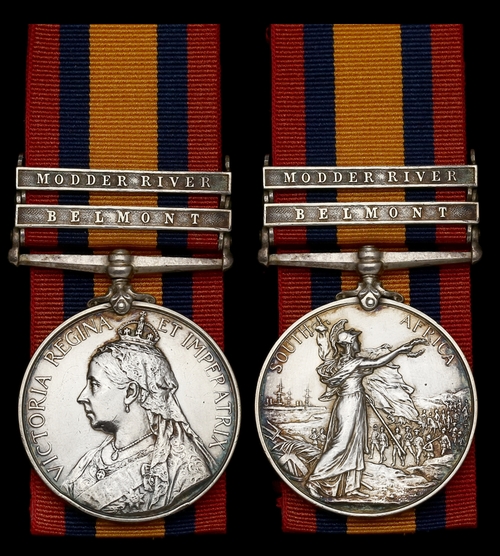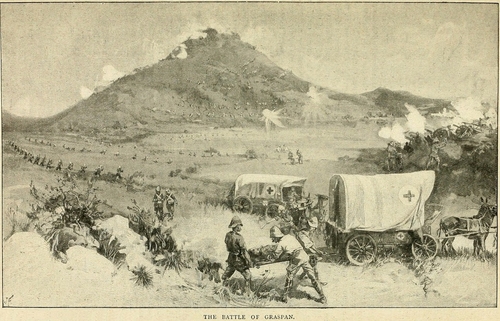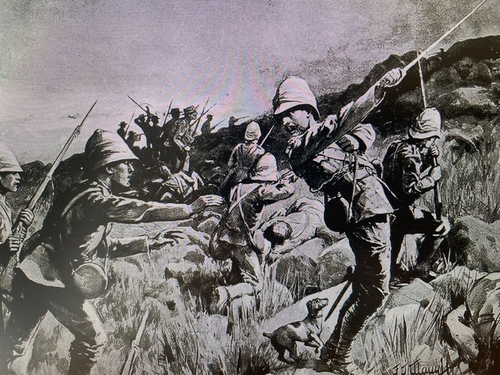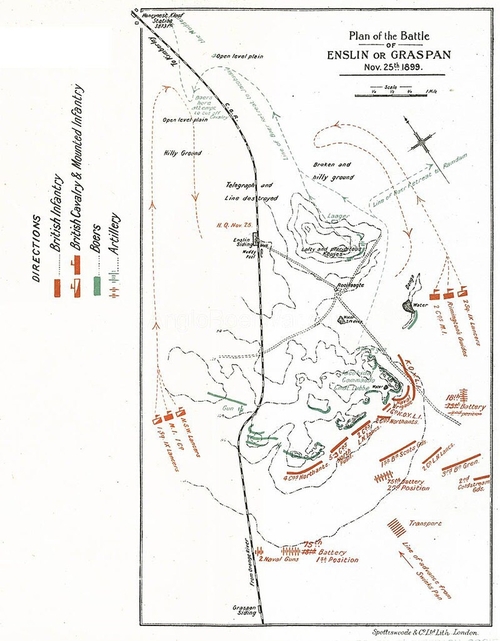Auction: 25002 - Orders, Decorations and Medals
Lot: 22
The Queen's South Africa Medal awarded to Lance-Sergeant A. Vass, Royal Marines Light Infantry, a gallant Bluejacket who served with the Naval Brigade of Monarch
Vass was amongst the wounded in the epic action at Graspan in November 1899, when severely wounded by a gunshot to the face, in which '...no better kept line ever went forward to death or glory’
Queen's South Africa 1899-1902, 2 clasps, Belmont, Modder River (8303 Pte. A. Vass, R.M. HMS Monarch), very fine
Alexander Vass was born at Creich Buressan, Argyllshire on 25 November 1873 and was a farm servant upon his joining the Royal Marines Light Infantry at Glasgow on 17 April 1895. He joined Monarch in January 1897 and was landed with her Naval Brigade on 21 October 1899 for the Boer War in the support of Durban. The Bluejackets of Monarch comprised some 190 Marines and 50 Seaman, manning their two 12lb Naval Guns adapted by Captain Scott for the purposes. They set off for the relief of Kimberley.
Graspan - severe wounds
At 0700hrs on 25 November 1899, at Graspan, the infantry began to work forward under the cover of artillery fire. The Naval Brigade led the storming force, extended in a single line, each man six paces apart from his neighbour. As they began the ascent, advancing by brief rushes in very open order, the hill suddenly appeared to swarm with enemies; from the crest, from behind every boulder poured a murderous fire. The naval officers of the Brigade still carried swords and could be readily distinguished; they were the target of every Boer rifle. Major Plumbe of the Marines, who was gallantly leading in front of his men, closely followed into the storm of battle by his little terrier, staggered, shouting to his soldiers, not to mind him, but to advance. He never rose again. Colonel Verner, who survived the action, afterwards stated that ‘no better kept line ever went forward to death or glory’. However, so terrible was the fire and so annihilating it’s effects upon the Brigade, that the order had to be given to retire upon the last cover.
For a moment it seemed as though the attack had failed. But the artillery poured its fire upon the crest of the ridge with more vehemence than ever; and up the slopes in very open order, firing and cheering, came the Yorkshire Light Infantry to the support of the hard pressed Naval Brigade, while the Loyal North Lancashire’s and Northumberland’s too, were sweeping forward upon the line of heights held by the Boers. Once more the Seamen and Marines pressed upward at an order from the wounded Captain Prothero ‘Men of the Naval Brigade, advance at the double; take that Kopje and be hanged to it.’ The men responded magnificently. For the last few yards of the advance the Boers could no longer fire with safety at their assailants. Their very position became disadvantageous as the slopes were so steep that they had to stand up to see their assailants, and in the deluge of shrapnel and rifle bullets which beat upon the summit, this meant almost certain death. Lieutenant Taylor of the Navy and Lieutenant Jones of the Marines, the last in spite of a bullet in his thigh, were the first into the Boer entrenchments at the top. They were closely followed by their men, and the Kopje was won.
‘I shall never forget the faces of some of those who had fallen in the final rush,’ said Colonel Verner, of the dead of the Naval Brigade. ‘They lay about in every attitude, many with their rifles, with bayonets fixed, tightly clutched in their hands, and in some cases still held at the charge. These were the same hard featured, clean cut faces, which but a short time before I had watched laboriously skirmishing across the veldt, now pale in death, but with the same set expression of being in terrible earnest to see the business through.’
Vass was one of those who suffered wounds - of a severe nature - in the action. He took a bullet wound to the head, which entered in front of his right ear, passed down his neck and emerged behind the right scapula (Globe & Laurel, January 1900, refers). The gallant Marine was awarded a 'Hurt Certificate' for the wound which, once healed, 'extended from the left side of his head to the right'. He was transferred to Powerful on 2 March 1900.
Promoted Corporal in June 1900, he was presented his Medal & 2 clasps in January 1902 and was made Lance-Sergeant in July 1903. Reduced Private in August 1904, Vass was discharged in April 1907, going to live at Smollett Street, Bootle. With the outbreak of the Great War, he returned to the fold and was posted to Macedonia (1914-15 Star Trio). Vass was released in February 1919, he was not in receipt of the R.F.R. L.S. & G.C. Medal.
The Graspan Royal Marines Memorial, is an outdoor bronze sculpture by Adrian Jones, installed on the north side of The Mall in London. It is the focus of the annual Marines marches.
Subject to 20% VAT on Buyer’s Premium. For more information please view Terms and Conditions for Buyers.
Sold for
£750
Starting price
£320











